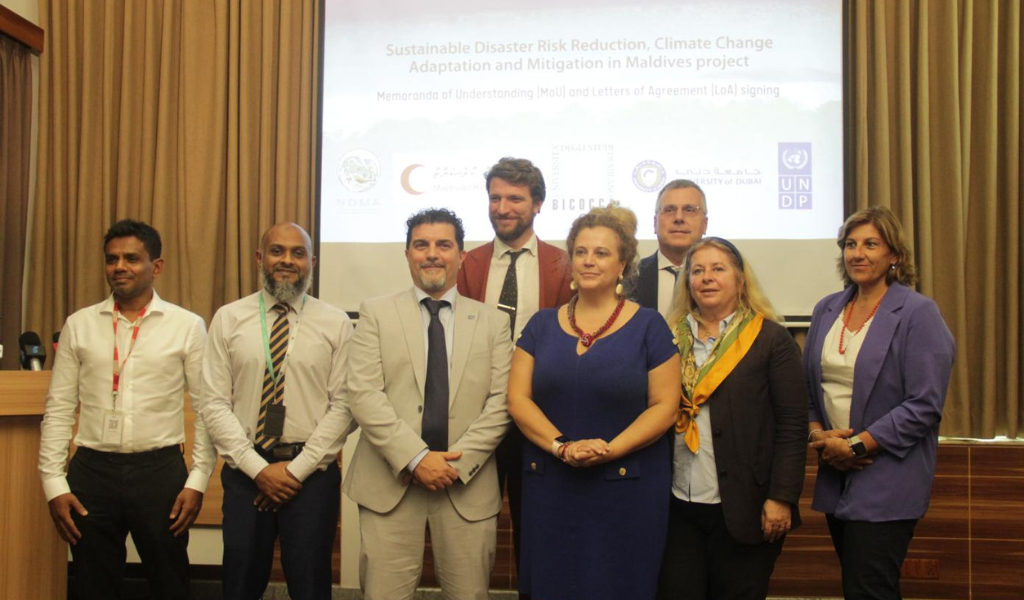
MoUs Signed To Support Sustainable Disaster Risk Reduction, Climate Change Adaptation & Mitigation In Maldives Project
On Sunday, United Nations Development Programme (UNDP) in Maldives announced that they have signed Memoranda of Understanding (MoU) and Letters of Agreement (LoA) with project partners to support the ‘Sustainable Disaster Risk Reduction, Climate Change Adaptation and Mitigation in Maldives’ project. The signing ceremony took place at Hulhumale and was attended by project partners including the National Disaster Management Authority (NDMA), Maldivian Red Crescent (MRC), University of Bicocca-Milano and University of Dubai as well as representatives from UNDP Maldives.
This project marks a collaborative effort between United Nations in the Maldives and the Local Government Authority and is funded by the SIDS Joint SDG Fund. The UNDP and NDMA have been working closely to implement Disaster Risk Reduction (DRR) in Maldives to align with the Climate Change and Adaptation (CCA) efforts. Through this, the two organizations strive to upscale national and subnational development by building stronger resilience and preparedness as instructed by the Maldives Strategic Action Plan (SAP) and Agenda 2030.
The UNDP Resident Representative, Mr. Enrico Gaveglia presided over the signing ceremony held last Sunday together with the Chief Executive of NDMA, Mr. Hisaan Hassan, President of MRC, Mr Abdul Haleem Abdul Latheef and Rector of the University of Bicocca-Milano, Dr. Giovanna Iannantuoni.
The signatory agencies seek to consolidate and facilitate concrete actions, collaboration and communication between national and subnational governments to carry forward DRR and CCA efforts in the Maldives. This will be done while supporting Maldives’ policies and enabling conditions to maintain DRR/CAA planning and implementation at an island community level.
As per the partnership, efforts will be driven into establishing new implementing regulations, promoting national-subnational institutional coordination mechanisms and putting into place island-level standard operating procedures and capacities to operationalize the Maldives’ vision of building local-driven resilience.
Through these measures, it is expected to yield long-term development benefits to populations, particularly those that are vulnerable and at high risk. This includes women, unemployed and at-risk youth, migrant workers, older persons, children and persons with disabilities as well as communities based in areas with high-risk exposure to climate-induced disasters.
The partnership with NDMA & MRC will explore avenues of joint baselines of natural and human-induced disasters and impacts of environmental degradation. Furthermore, it will focus on strengthening existing national data and information management systems for DRR/CCA monitoring, in addition to working on reviewing school and community preparedness plans to increase preparedness at national/subnational levels.
The collaboration with University of Bicocca-Milano and University of Dubai will bring the experience of quality data and information management systems for DRR/CCA monitoring to include loss and damage analytics with the implementation of capacity development modules for local councils and Women's Development Committees (WDCs) on the CCA/DRR planning part of the academia’s efforts on the ongoing ‘188 Better Islands’ project.
“International aid is often perceived scattered and siloed in Maldives. UNDP’s role is to frame a new set of cooperation that bring the best of global practice and delivers communities’ solutions immediately. Taxing national partners and people with endless consultations around issues and plans has now given way to concrete transformative change. This is why we are here.” Stated Mr. Enrico Gaveglia